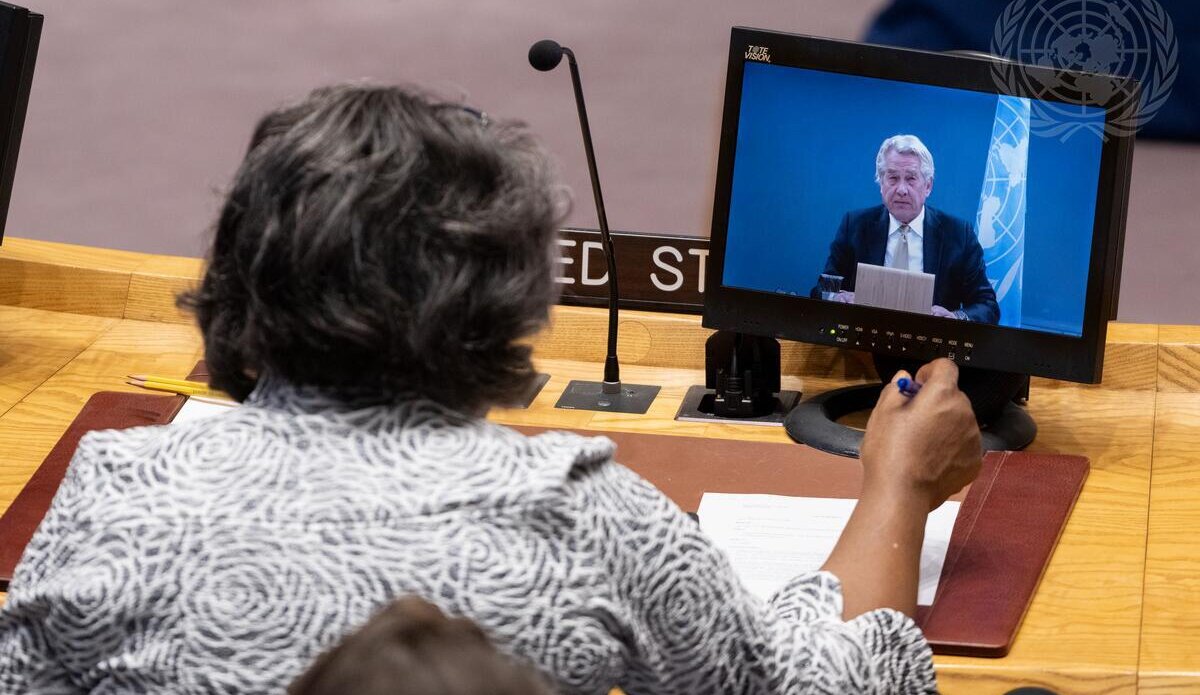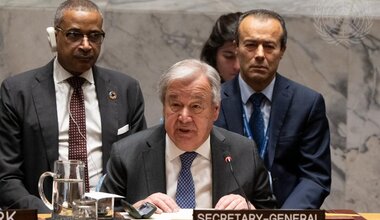Security Council Briefing on the Situation in the Middle East (As delivered by Special Coordinator Tor Wennesland)
Madam President,
Members of the Security Council,
As we approach 140 days of devastating war, there is still no end in sight.
No end to the trauma of those impacted by the horrors unleashed on 7 October.
No end to the suffering and desperation of the people in Gaza.
No end to the regional turmoil.
I was in Gaza this week to see first-hand the unfolding tragedy and to meet with our tireless and brave teams on the ground who face impossible challenges to deliver life-saving assistance to Palestinian civilians in the Strip. What I saw was shocking and unsustainable.
I am deeply concerned about a possible full-scale Israeli military operation in the densely populated Rafah area, where some 1.4 million Palestinians are sheltering and where we have the only points of entry of humanitarian goods.
I cannot stress enough how urgently we need a deal that will bring about a humanitarian ceasefire and the release of hostages. I reiterate my call for the immediate and unconditional release of all hostages and for a humanitarian ceasefire.
In the meantime, I will continue to urge all concerned – including Israeli authorities - to address the key impediments to our humanitarian response on the ground. We need more safety measures, greater security and the tools and access points to scale up aid, particularly in the north of the Strip.
I am also continuing my extensive engagements in the region and internationally, to both support all efforts toward a ceasefire and bring about a more common understanding and coordinated approach to addressing the complex humanitarian, security and political crises affecting not only Gaza, but the whole of the Occupied Palestinian Territory, Israel and the region.
I am convinced that there is no time to lose in laying the framework for Gaza’s recovery and for a long-term political resolution of the Israeli-Palestinian conflict, including by advancing meaningful, irreversible steps towards a two-State solution.
Madam President,
According to the Ministry of Health in Gaza, from 18 January through 16 February, 4,327 Palestinians were killed and over 7,000 injured in fighting and Israeli operations in the Strip, bringing the total Palestinian fatalities in the war to more than 28,000, many women and children.
The IDF has said that over 10,000 Palestinian fatalities are militants.
In addition to the approximately 1,200 fatalities on 7 October in Israel, Israel Defense Forces (IDF) reported 235 security forces personnel killed in Gaza since ground operations began. Of the 253 hostages kidnapped on 7 October, some 134 are believed to be still held hostage by Hamas, 112 have been freed, and 11 bodies recovered.
160 UN staff have been killed in Gaza – the largest single loss of life in the history of the Organization.
Madam President,
Battles have continued across Gaza, including a campaign in Khan Younis that began in late January and, more recently, intensified airstrikes in the densely populated Rafah area.
Hospitals, schools and other protected sites continue to be severely impacted by military operations. The IDF has said that its forces are targeting Hamas fighters and equipment, as well as large-scale tunnel networks under these and other civilian infrastructure, used for military purposes.
On 15 February, the IDF entered Nasser Hospital in Khan Younis following days of shelling and sniper fire that killed 13 Palestinians. During a multi-day operation, the IDF arrested over 100 Palestinians, including health workers, who they said were involved in militant activity including the 7 October Hamas attack in Israel. While the World Health Organization evacuated some 50 critical patients including children, more than 100 patients remained behind and seven have reportedly died after generators were shut down. Israeli forces said they were acting on information that Hamas held hostages in the facility and were actively using the facility for military purposes.
Palestinian armed groups continued to fire indiscriminate rockets from Gaza towards Israel, albeit at reduced frequency and range.
Madam President,
Let me return in more detail to where I started this briefing: the desperate humanitarian situation in Gaza.
IDPs face acute shortages of food, water, shelter and medicine. Communicable diseases are rising amid unsanitary conditions; and over 2 million people face extreme food insecurity, with women and children at greatest risk. This desperation and scarcity has led to a near total breakdown in law and order.
Essential services have been heavily impacted by the fighting. Eighty-four percent of health and education facilities are either damaged or destroyed. Over 62 percent of all roads and electricity feeder lines are unusable.
My Deputy and Humanitarian Coordinator has a plan to deliver the essentials – food, shelter, medicine and water/sanitation – but, our capacity to deliver depends on coordinated humanitarian movements, effective deconfliction with the parties and Israeli approvals for essential communications equipment and armored vehicles – all of which provide the minimum conditions for staff to work safely.
This must be improved – UN convoys and compounds must not be hit and our equipment needs clearance—fast.
Keeping Gaza on a drip-feed not only deprives a desperate population of life-saving support, it drives even greater chaos on the ground and further impedes humanitarian delivery.
On 20 February, WFP announced that it was forced to pause deliveries to northern Gaza following multiple security incidents. Convoy movements had only just resumed two days earlier following a three-week suspension in the wake of a strike on a UN truck.
For this reason, I renew our appeal to open additional access points to the northern part of Gaza to increase the flow of aid, reduce congestion in the south and relieve some of the pressure on the population and the staff seeking to deliver.
Madam President,
Israel has provided information that 12 UNRWA staff were involved in the brutal attacks against Israelis on 7 October. These allegations are appalling, and such acts must be condemned. The Secretary-General and UNRWA took swift action, including terminating employment of the ten active staff members and launching internal and independent investigations. Nevertheless, key donors have suspended aid amounting to over half of the Agency’s forecasted income for 2024. While we address the very serious allegations at hand, we must recognize that UNRWA remains the backbone of humanitarian response on the ground. I reiterate the SG’s appeal to donors to guarantee the continuity of UNRWA operations – not only for Gaza, but for the stability of the region.
Madam President,
Turning to the occupied West Bank, 27 Palestinians, including eight children, were killed by Israeli security forces – the majority in the context of Israeli operations in Area A, often including armed exchanges with Palestinians.
On 30 January, an undercover IDF unit killed three Palestinians inside a hospital in Jenin, one of whom was a patient. The IDF said that the three, who were claimed as members by armed groups, were planning an attack against Israelis.
During the reporting period, three Israelis, including one woman, were killed in Palestinian shooting attacks in the occupied West Bank and in Israel, including two at a bus stop on 16 February by a Palestinian who was also killed at the scene.
In today’s early hours, a deadly terror attack by three Palestinians on Israeli commuters near the Maale Adumim settlement outside Jerusalem is yet another reminder of the boiling tension on the ground.
Settler attacks against Palestinians and their property also continued.
On 1 February U.S. President Biden issued an Executive Order imposing sanctions on “persons undermining peace, security and stability in the West Bank.” Four Israeli settlers have been sanctioned under the order, while the UK and France have also announced sanctions against settlers.
Settlement activity also continued as Israeli authorities published tenders for approximately 420 housing units in Area C settlements.
On 14 February, after an extended legal battle, Israeli authorities demolished the home of a prominent community leader in al-Bustan, in occupied East Jerusalem, citing the lack of Israeli-issued building permits, which are almost impossible for Palestinians to obtain.
I am concerned that if the violence in Gaza does not end, and tensions and restrictions remain high in the West Bank, including at the Holy Sites in East Jerusalem, the Holy month of Ramadan risks becoming another volatile marker rather than a time of contemplation and healing.
I also remain deeply concerned about the economy in the West Bank and the PA’s fiscal crisis.
In this context, I welcome Norway’s announcement on 18 February that an arrangement was reached with the parties to facilitate a partial transfer of the monthly clearance revenues, not including the amount Israel says the PA transfers to Gaza.
I am also encouraged that the Palestinian Prime Minister announced several judicial, security, administrative and financial reforms last month, but more remains to be done.
Madam President,
In the international arena, on 26 January, the International Court of Justice issued provisional measures in the case of South Africa vs. Israel on the application of the Convention on the Prevention and Punishment of the Crime of Genocide in the Gaza Strip.
I welcome the recent visit of the Special Representative of the Secretary-General on Sexual Violence in Conflict to gather information on reports of sexual violence in the context of the 7 October attacks.
Madam President,
I remain gravely concerned over the serious risk for a further regional escalation.
Across the Blue Line, exchanges of fire between Israel and Hizbullah continue to intensify, with several civilian casualties reported in recent days. Approximately 100,000 Israelis and over 87,000 Lebanese are displaced from their communities.
Firing from Syria towards the Israeli-occupied Golan and strikes by Israel against targets in Syria also continued, including Syrian claims of Israeli strikes on locations in Damascus and Homs.
On 28 January, three U.S soldiers were killed and over 40 injured in a drone attack on a U.S. military outpost in the northern part of Jordan. U.S. forces responded with strikes on targets in Syria and Iraq. Houthi forces continued to launch attacks against vessels in the Red Sea, with strikes reported against Houthi targets in Yemen.
Attacks against international shipping routes must cease immediately. I urge all relevant actors to take steps to immediately de-escalate.
Madam President,
The scale of the emergency we are facing is staggering and could quickly spiral out of control in the region.
I appeal for a collective, coordinated and comprehensive response to not only address the immediate crisis before us in Gaza, but to help restore a political horizon for Palestinians and Israelis, alike, while promoting greater stability and peace in the region.
To do this, we urgently need a deal to achieve a humanitarian ceasefire and the release of hostages.
We need to create the space for moving forward through dialogue rather than violence.
Ultimately, the only long-term solution for Gaza is political. While taking into account Israel’s legitimate security concerns, there must be a clear path toward restoring a single, effective Palestinian governance across the OPT, including in Gaza. International support to strengthening and reforming the Palestinian Authority to improve domestic and international legitimacy will be crucial.
To create the conditions for this to work, there must also be a timebound steps within a political framework to end the occupation and establish a two-State solution in line with relevant UN resolutions, international law and bilateral agreements.
These efforts must coalesce and accelerate if we are to emerge from this nightmare onto a trajectory that can provide Palestinians and Israelis with a chance of lasting peace.
Thank you.
 UN
UN



![Sigrid Kaag, United Nations Special Coordinator for the Middle East Peace Process Ad Interim, briefs the Security Council meeting on the situation in the Middle East, including the Palestinian question. [UN Photo/Manuel Elías - 28 May 2025]](https://unsco.unmissions.org/sites/default/files/styles/380x220/public/field/image/un71101108_250528-me_ted_101102-48874_.jpg?itok=3ZE5kRpP)

